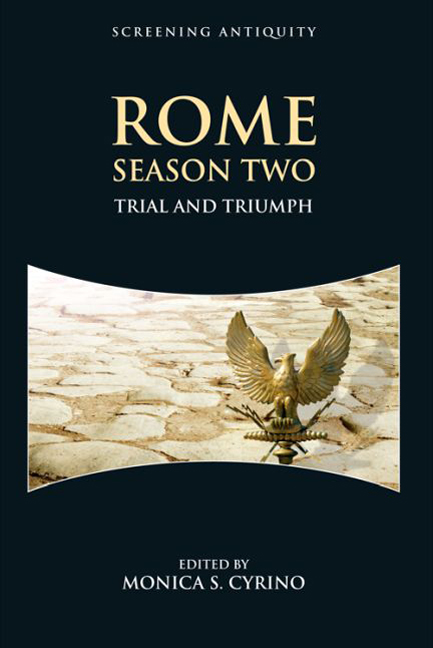Book contents
- Frontmatter
- Contents
- Series Editors’ Preface
- Editor's Acknowledgments
- Contributors
- List of Illustrations
- Episode Listing
- Cast List
- Introduction: The Trials and Triumphs of Rome, Season Two
- PART I POWER AND POLITICS
- PART II Sex and Status
- 8 Revenge and Rivalry in Rome
- 9 Effigies of Atia and Servilia: Effacing the Female Body in Rome
- 10 Livia, Sadomasochism, and the Anti-Augustan Tradition in Rome
- 11 Windows and Mirrors: Illuminating the Invisible Women of Rome
- 12 Antony and Atia: Tragic Romance in Rome
- 13 Problematic Masculinity: Antony and the Political Sphere in Rome
- 14 Rome, Shakespeare, and the Dynamics of the Cleopatra Reception
- 15 The Rattle of the Sistrum: “Othering” Cleopatra and Egypt in Rome
- 16 Gateways to Vice: Drugs and Sex in Rome
- 17 Slashing Rome: Season Two Rewritten in Online Fanfiction
- Filmography
- Bibliography
- Index
14 - Rome, Shakespeare, and the Dynamics of the Cleopatra Reception
from PART II - Sex and Status
Published online by Cambridge University Press: 07 October 2017
- Frontmatter
- Contents
- Series Editors’ Preface
- Editor's Acknowledgments
- Contributors
- List of Illustrations
- Episode Listing
- Cast List
- Introduction: The Trials and Triumphs of Rome, Season Two
- PART I POWER AND POLITICS
- PART II Sex and Status
- 8 Revenge and Rivalry in Rome
- 9 Effigies of Atia and Servilia: Effacing the Female Body in Rome
- 10 Livia, Sadomasochism, and the Anti-Augustan Tradition in Rome
- 11 Windows and Mirrors: Illuminating the Invisible Women of Rome
- 12 Antony and Atia: Tragic Romance in Rome
- 13 Problematic Masculinity: Antony and the Political Sphere in Rome
- 14 Rome, Shakespeare, and the Dynamics of the Cleopatra Reception
- 15 The Rattle of the Sistrum: “Othering” Cleopatra and Egypt in Rome
- 16 Gateways to Vice: Drugs and Sex in Rome
- 17 Slashing Rome: Season Two Rewritten in Online Fanfiction
- Filmography
- Bibliography
- Index
Summary
Almost at the end of Shakespeare's Antony and Cleopatra (ca. 1607), the tragic queen expresses her fears (5.2.214–21):
Saucy lictors
Will catch at us like strumpets, and scald rhymers
Ballad us out o’ tune. The quick comedians
Extemporally will stage us, and present
Our Alexandrian revels; Antony
Shall be brought drunken forth, and I shall see
Some squeaking Cleopatra boy my greatness
I’ the posture of a whore.
This metatheatrical prophecy is revisited in the second season of HBO–BBC's Rome as it begins and concludes with Antony's orgiastic excesses and a shrill Cleopatra's twin attempts to prostitute herself for survival. The Cleopatra scenes are indeed heavily indebted to Shakespeare's play but, as Jonathan Stamp and Bruno Heller note in the DVD commentary to the last episode, they do try to find “a new way into something familiar.” In doing so they have crafted a novel and modern reception of the Cleopatra story by invoking Shakespeare – and film – to underscore their departures, by emphasizing some frequently neglected parts of Plutarch, and most notably by attempting to tell the story of both Antony and Cleopatra while weaving their stories into the series’ story arcs of Octavian and Pullo. The result is a creative and successful addition to the Cleopatra reception.
CLEOPATRA AND ROME
Cleopatra's appearance in episode 8 (“Caesarion”) of Rome's first season is discussed in depth by me elsewhere.2 In this episode, the fic-tionalized core protagonists Pullo and Vorenus rescue the drug-addled princess from her brother's minions. On the way back to Alexandria, the slave Charmian detoxes Cleopatra and devises a plan to ensure her mistress’ pregnancy by enlisting first Vorenus, who declines, and then a more willing Pullo. After emerging disheveled from a proper Plutarchan sack in a pose mirroring Claudette Colbert's in Cecil B. DeMille's Cleopatra (1934), she is able to seduce Caesar, secure her throne, and give birth to Caesarion, as Pullo cheers lustily for his progeny. I have argued that this episode shows a keen awareness of Shakespeare, Plutarch, and several twentieth-century films. Her appearance, initial stupor, and serpent-like sensuality were quite a shock to many viewers. Cleopatra appears in the second season in episodes 14, 20, 21, and 22, which also bear witness to similar influences and offer their own novel depictions.
- Type
- Chapter
- Information
- Rome Season TwoTrial and Triumph, pp. 182 - 192Publisher: Edinburgh University PressPrint publication year: 2015



